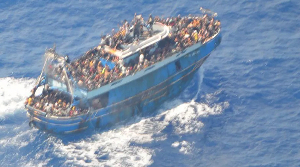 The overcrowded vessel was pictured a number of times before tragedy struck
The overcrowded vessel was pictured a number of times before tragedy struck
A court in Greece has abandoned the trial of nine Egyptian men accused of causing the biggest migrant shipwreck in the Mediterranean Sea for a decade.
The judges in the southern port city of Kalamata ruled they did not have jurisdiction to hear the case on the grounds the vessel sank in international waters.
It is feared more than 600 people drowned last June when an overcrowded fishing boat, the Adriana, sank on its way to Europe from Libya.
The accused had faced life in prison if convicted of people-smuggling and causing the sinking of the boat. There were cheers among protesters outside the court as the judges' decision to drop the case became clear.
The indictment seen by the BBC showed that the defendants were being prosecuted on evidence that had already been contradicted by at least six survivors, who said the coastguard had caused their boat to capsize and then pressured them to frame the Egyptians.
Human rights groups, including Amnesty International and Human Rights Watch, said they had strong reservations about the integrity of the Greek investigation and evidence, and questioned whether the defendants would receive a fair trial.
The Greek coastguard has constantly denied their actions brought about the disaster and the authorities have rejected all claims of wrongdoing or of a cover-up. The allegations are being considered by the Greek Naval Court.
Up to 500 feared lost at sea
The nine defendants, who are Egyptian and aged between 20 and 41, went on trial on Tuesday.
The men were all on board the Adriana fishing boat that sank in international waters, but in Greece’s demarcated rescue area - in one of the deepest parts of the Mediterranean - on 14 June last year.
It is estimated the boat was carrying up to 750 migrants when it set off nearly a week earlier from the port of Tobruk in Libya.
Eighty-two bodies were recovered, but the United Nations believes an additional 500 people - including 100 women and children who were in the hold of the boat - may have died.
The court said the men could not be judged on the charge of setting up a criminal organization and causing a shipwreck, because it happened so far from the Greek coast.
As a result, it declared them innocent of further charges of illegal entry to Greece and ruled they were not smugglers.
The prosecutor had earlier conceded the defence’s argument there was no legal basis to try the men because the ship went down outside Greek waters, albeit in the demarcated Greek rescue zone.
The Greek coastguard had been following the boat for at least seven hours before the sinking happened, but later said it did not attempt a rescue because the vessel was travelling safely at a "steady speed" and on a "steady course" to Italy - and that passengers were not in danger.
A previous BBC investigation cast serious doubt on these claims.
When the BBC put allegations to Greece’s prime minister last November, Kyriakos Mitsotakis said they were being investigated but that culpability rested with the smugglers.
"Our coastguard has saved tens of thousands of people at sea and we should be grateful for the work they do," Mr Mitsotakis said.
Condition of the boat central to prosecution case
The indictment, obtained by the BBC, reveals that Greek prosecutors accused the nine Egyptians of causing the disaster by skippering an extremely overcrowded vessel, which they knew posed an obvious danger to life.
It reads: "The fishing vessel was not seaworthy as it was old and badly maintained and not fit to transfer such a large number of people, especially for such a huge distance while there were no life jackets."
The prosecution argued that each of the defendants took turns to steer the vessel and were all aware that the severe overcrowding on both the deck and in the hold was badly affecting stability.
The indictment also alleged that the nine Egyptian men were part of a smuggling gang and charged each passenger between $4,000 and $8,000 (£3,100 and £6,300) for a spot on the boat.